The Fascinating, Exciting, Mind-Numbing Life Of An Extra
We don't usually feature reader/listener blog posts here at /Film (although I do hope that will change in the future). However, /Film reader, /Filmcast listener, and Tobolowsky Files intern Andrew Goldfarb recently wrote a post about his work as an extra/background artist over the past four years that I could not resist re-posting here. It's informative, funny, harrowing, and kind of riveting.
If you've ever wondered about the fascinating life of an extra, read on. Andrew's post was originally published at his IGN blog. It has been republished here with his permission.
***
For the past four years, I've worked full-time as a background actor in film and television. I went to school at the University of Connecticut. At the end of my junior year in 2007, there were rumors that the fourth Indiana Jones movie would be filming in New Haven at the Yale campus. With no idea what a disaster the film would eventually end up being, my friends and I excitedly discussed the possibility of catching a glimpse of it filming.
I spent that summer at my parents' house, and in early June my dad showed me an article in the New Haven Register. It announced an open casting call in New Haven in search of a few hundred people to work as extras in Indiana Jones IV. A week later, I found myself on the streets of New Haven at 6 a.m. near the front of a line with thousands of people in it.
I should clarify that I wasn't in school for acting at the time. I wasn't sure exactly what I wanted to do, but I knew I wanted writing to be a part of it. I began my college career as a Journalism major, but soon switched to Film Studies (the closest thing we had to a screenwriting major) and finally settled on English after my advisor told me a broader degree would help me get a job. While I was hugely interested in film and television, acting had never entered into the equation.
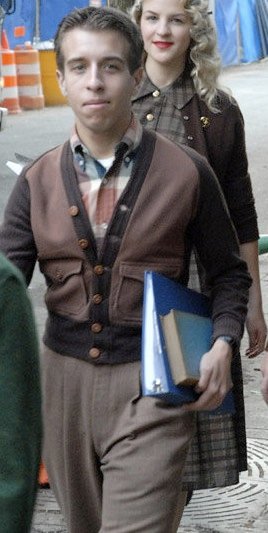
My Indiana Jones wardrobe
So, when I was chosen on the spot at the casting call, I had no idea that, for better or worse, it was the beginning of a career. At that time, I'd been chosen as a non-union extra. Working as an extra is under the jurisdiction of the Screen Actors' Guild (SAG) and the American Federation of TV & Radio Artists (AFTRA), two unions that I've since become a member of, but had never heard of at the time.
Non-union extras are on the lowest rung of a very tall ladder. Without being in the union, extra work is grueling and awful. You earn about $85 for a twelve-hour day and only receive an extremely small amount of overtime if you work longer. You aren't eligible for health insurance, and you don't get paid for meal penalties, wardrobe changes, props, make-up or any of the other benefits afforded to union actors. Basically, not being in the union makes it impossible to do this kind of work full-time.
Luckily, Indiana Jones was an extremely high-budget production, and those of us who worked on it were able to receive SAG waivers. Films and television shows must have a minimum number of SAG members on set. If not enough are available, then non-union actors can get waivers to basically be a union member for the day. Once you've earned three of these waivers, you're eligible to join the union after paying a fee. In big markets like New York and L.A., people can work for a decade and only receive one waiver. During my time on Indiana Jones, I received all three.
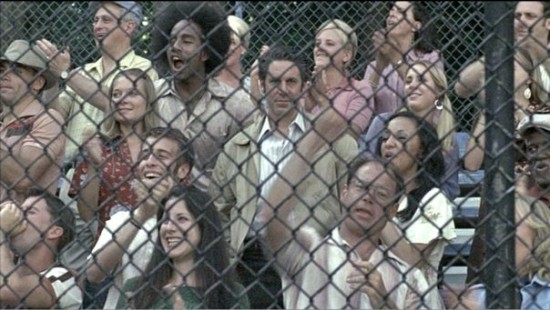
My TV debut smiling & clapping in Oprah's For One More Day
That summer was a particularly busy one for filming in New England, and after Indiana Jones, I was able to work on College Road Trip, Righteous Kill and Oprah's TV movie For One More Day, among others. It was the most I'd earned in a single summer, and I went into my senior year with some good stories and every intention of moving on to my career in writing.
The following January, I decided to use my waivers to join SAG. It was my final semester of college, and while I still had no plans to act, I figured a SAG card was at least an interesting resume entry, and my days on set had more than paid for the entrance fee. I soon became a card-carrying union member and subsequently never shut up about it.
As graduation rolled around, that SAG card became as much of a crutch as a bragging right. Each time my mom reminded me that I'd need insurance after graduation, I reminded her that I could get it through the union. When she argued with me that moving in with friends in New York was a bad idea until I had a job, I'd tell her I could immediately get work as an extra to get started, and then I'd have some money to transition. My union membership became a sort of safety net, and as a lazy college kid with senioritis, I was more than happy to fall into it. I graduated in May of 2008 and didn't apply to a single job that summer.
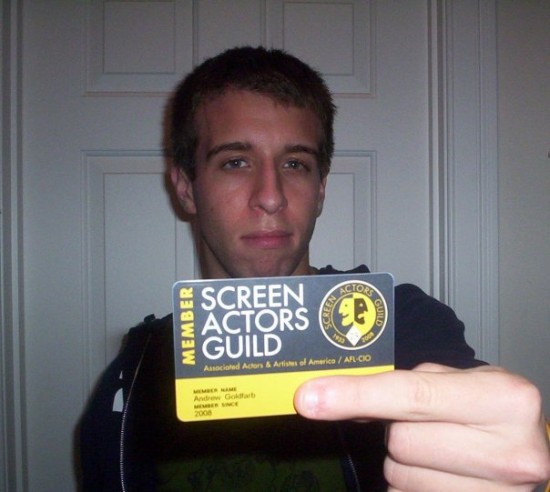
After a few months of commuting back and forth from my parents' house in Connecticut and sleeping on my friend's couch in Brooklyn, I finally moved into my first New York apartment in September of 2008. By the end of the month, I had my first job in New York City: a day on the first season of Fringe.
Getting work as an extra usually requires a site like Casting Networks, where you can upload your headshots, resume, and measurements. Casting companies list jobs and you can submit to each individual job by clicking and submitting your info. If you're right for the part, you'll get a call, which usually means one day of work. Luckily, I was called early on by Gossip Girl and quickly became a core high school student.
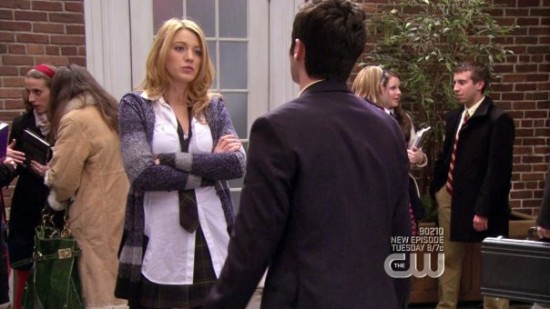
On the right as a student on Gossip Girl
Being a "core" extra means recurring as the same character and getting consistent work. Most casting directors take continuity very seriously, so if you portray a bike messenger one day, they don't want to bring you back as a lawyer for the same episode. It's a weird rule since we usually end up out of focus and unrecognizable anyway, but the idea is that if anyone noticed, it would ruin the illusion. Being on a show as core can mean three to five days a week of work, which is exactly what I got from Gossip Girl.
In-between Gossip gigs, I also began getting stand-in work. Of the many times actors rehearse a scene with the director, one is called a marking rehearsal. This is when crew members use tape to mark where the actors will stand during a scene. A stand-in is roughly the same height, weight and complexion as the actor, and after the rehearsal, while the actor goes through make-up or heads back to their trailer, the stand-in will be on the actor's mark so the crew can continue to adjust camera angles and lighting even without the actual actor in the room.
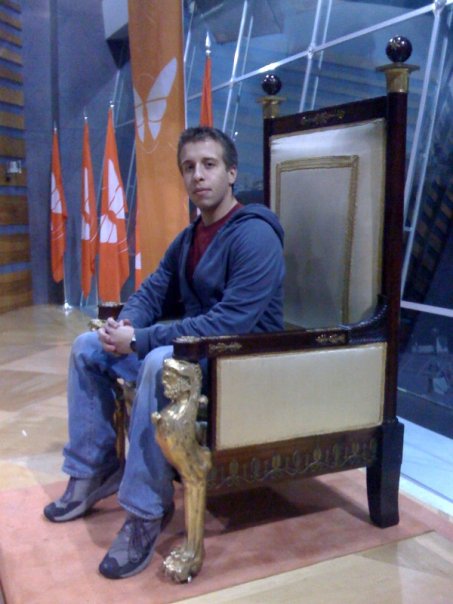
Me in the king's throne on the set of the NBC show Kings
As an average height white guy, I pretty quickly began lining up stand-in jobs for perps or victims on the various Law & Order spinoffs. I joined AFTRA in late 2008, which helped me get jobs I wasn't eligible for before. I also quickly learned that being fairly nondescript was a good thing, since I could play just about anything if you put me in the right uniform.
2008 and 2009 were by far my busiest years, and I loved it. I'd be in a good mood even after 90 hour work weeks. I was seeing amazing things and meeting amazing people. There were weeks where I'd work five days and be in each of the five different NYC boroughs, and I was learning how to get around the city much faster than I expected to. Even though I didn't mind it at the time, this was the beginning of the absolute destruction of my sleep schedule.
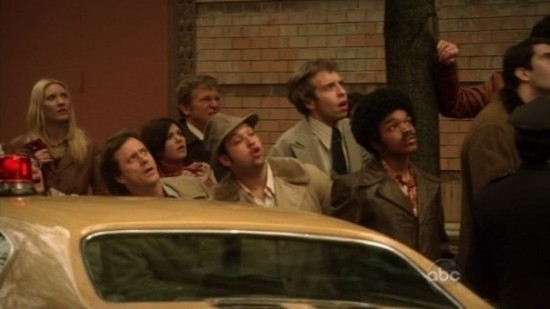
To the left of the tree as a 1970's onlooker in Life On Mars. The wig was itchy.
When you get called to be an extra, you're usually not told where you'll be filming or when you'll need to be there. That information comes the night before, usually in the form of a voicemail that you call into. Your call time can be anything. I've worked days that were 4 p.m. to 9 a.m., 5:30 a.m. to midnight, and even just a standard 9:00 a.m. to 5:00 p.m., occasionally. Your hours are completely undefined, meaning there's no minimum or maximum. Some days could be one scene and only last a couple hours, or other days could approach the 20 hour mark.
Pay for union actors is scaled based on the length of your day. Depending on whether you're working for SAG or AFTRA and whether you're a stand-in or just an extra, you make roughly $150 (give or take $10) over 8. This means that if you work for any amount of time up to 8 hours, you get $150, which breaks down to $18.75 per hour for an eight hour day (or more if the day is shorter). If you work beyond the eight hour mark up to ten hours, you're making time and a half ($28.13 per hour) for those two hours. Between hours ten and sixteen you're making double time, or $37.50 per hour. In the rare cases where a day exceeds sixteen hours, you enter golden time, which is the full $150 per hour from that point on.
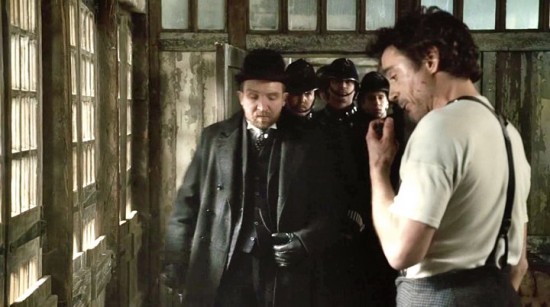
Above Robert Downey Jr.'s fist as a cop in Sherlock Holmes
In 2009 and 2010, I did hundreds of single days on various films and TV shows. I was also given a few other recurring jobs. I continued to work on Gossip Girl even after the characters graduated high school, now playing a college student. For most of season four, I was a recurring page on 30 Rock. I was Macaulay Culkin's stand-in for the run of NBC's show Kings and spent two weeks in a courtroom on the James Franco movie Howl. My most recent core job was two months last summer as a busboy on the Will Ferrell-produced Comedy Central show Big Lake.
As I mentioned earlier, many casting directors don't like to cast you in a project you've already appeared in, so I've worked hard to keep as few credits as possible on my IMDb page. This makes it hard to keep a running list of every single thing I've been in, but if it was filmed in New York between late 2008 and late 2010, I probably worked on it.
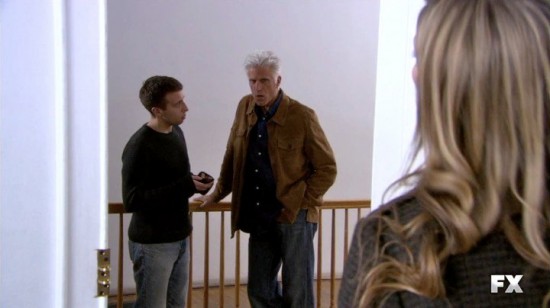
Me as Ted Danson's assistant on Damages
Once 2011 began, I made a decision. Working as an extra has been fascinating and I've had some amazing experiences, but it's time to move on. Since every job is on a different set with a different crew, there's never a sense that I'm moving forward or will ever earn any kind of seniority. I feel like I'm spinning my wheels, and so it's time to get out while I can.
It's amazing how much a job like this can take over your life. Nearly every piece of clothing I own is in a neutral color with no patterns or logos since that's the kind of wardrobe I needed for work. My sleep schedule, as I mentioned earlier, has been completely destroyed, and it's very rare for me to get more than four hours of unbroken sleep. It's also been impossible for me to make any long-term plans, since I'm never given more than twenty-four or forty-eight hours' notice for work and can't plan ahead.
Out-of-season days have been brutal, too. Many shows shoot during the winter but take place in the summer, meaning long days of exterior shots wearing shorts and t-shirts in thirty degree weather. The opposite also happens, and I've heard far too many stories about extras passing out while wearing heavy winter coats in ninety degree weather.
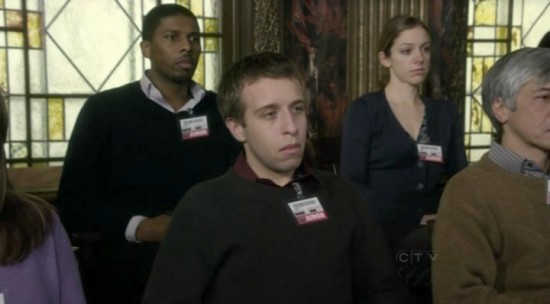
Me as a sleepy jury member in Law & Order: Special Victims Unit
Most of all, I find myself starving to be producing something. For as many hours as I've put into this job, all I have to show for it are a few funny stories and some screenshots. It's been nice being paid to stand or walk behind famous people, but it's time for me to have some kind of actual output.
So what's next? I'm not sure, but it will involve writing. I've been applying to as many internships and freelance positions as possible in hopes of building a resume, and with any luck I hope to be actively writing (and being paid for it) by the end of this year. While I'm undeniably going through a quarter-life crisis, I'm excited by the idea that I don't know where I'll be or what I'll be doing in a year, and at least I have some good stories to fall back on (some of which may be coming to this blog in the future).
If you're interested in seeing more screenshots of my extra work, check out my album on facebook and for more updates be sure to follow me on twitter.
